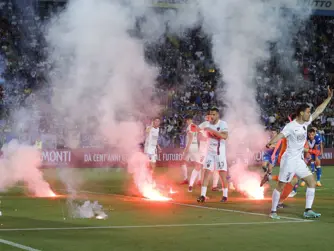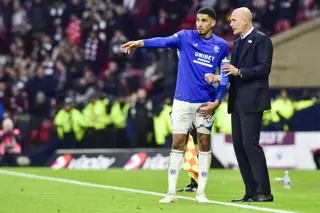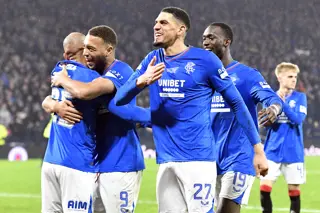Player Story
Leon Balogun: "Workplace has become more violent for footballers"

- Rangers and Nigeria defender spoke about the impact of violence towards footballers in their workplace on a Space on X (Twitter)
- Balogun, a member of FIFPRO’s Global Player Council, was one of several players surveyed for a report on workplace safety in men’s football, released in January 2024
- "I think it has developed over the last 16 years since I've been a professional," says Balogun
Rangers and Nigeria defender Leon Balogun feels social media has contributed to a rise in abusive behaviour aimed at players in their workplace – and says dialogue is needed to help create safer working environments in football.
Balogun, a member of FIFPRO’s Global Player Council, was speaking during a Space on X (Twitter) about the impact of violence towards footballers in their workplace.
It follows the release in January 2024 of FIFPRO’s Workplace Safety Report, which highlights the scale and impact of violence and abuse by fans towards professional footballers in the men’s game. The report draws on player interviews, a survey of 41 national player unions and media reviews.
"I have this feeling that this constant access to the real me as a player has lowered the threshold for fans in the stadium to a point where some think they are entitled to do things which they really aren't," said Balogun, 35.
2023 Workplace Safety Report: The impact of violence towards footballers in their workplace

"Some people, not the majority, feel because they have paid for a ticket to come to the stadium that it somehow automatically gives them the right to abuse you. There are people who just want to voice their frustration at you in a very inappropriate way.
"It has developed over the last 16 years since I've been a professional. It has taken a turn for the worse with the introduction and rise of social media."
According to the Workplace Safety Report:
- 85 percent of player unions agree that “in most instances the relationship between fans and players is very positive and should be cherished”;
- 76 percent of player unions said that workplace safety is a growing concern for professional footballers;
- 66 percent felt that in recent years parts of fan culture have “become increasingly more violent and abusive”.
The survey findings are supported by a Council of Europe committee state monitoring report published in November under the Saint-Denis Convention that says the number of arrests at sports events, and in particular football top tier leagues, "is considerable and can be considered a growing issue".
The use of flares or missiles are of particular concern, but violent acts also include players being attacked by pitch invaders or victimised from the stands.
"With the spread and the rise of social media, it has definitely become more violent," said Balogun. "I think there has always been a culture in football amongst a small group of supporters that had a tendency for violence. But what players and managers are exposed to in the stadium with the physical and the verbal abuse, the threshold seems to go lower and lower, and people are just not scared – and that's what's frightening to me."

Balogun continued: "I don't want people to think that footballers are sitting at home or in the dressing room before games thinking, ‘Oh my God, we have to go out there again. It's so horrible’. That's not the case. But we should be able to agree on a code of conduct, and I think we all know what is right and what isn't."
Balogun highlights the need for open dialogue to address issues surrounding players’ workplace safety. “We're in times where in general we need to look out for each other – it doesn't matter where you're from, it doesn't matter what you earn, it doesn't matter if you work in a public space or not.
"Ultimately, we all need to get along and create an environment where everybody feels safe to express themselves and to voice their opinion without harming one another. If we can remind ourselves of that every now and then, I think a huge part will be done."

Balogun is one of over 30 players who are members of FIFPRO’s Global Player Council, which includes the likes of Lucy Bronze, Nicolas Tagliafico and Maya Yoshida. The council is a platform for active players with international experience that assists FIFPRO and its 66 affiliated national player associations to support the work of FIFPRO and national unions in addressing global issues that affect their industry.
Balogun was speaking on the Space on X (Twitter) hosted by former Colombia international and FIFPRO’s Union & Player Relations Coordinator Isabella Echeverri. They were joined by Alexander Bielefeld (FIFPRO Director of Global Policy & Strategic Relations Men’s Football), Spyros Neofitides (Vice President of Cypriot player union PASP) and Paulo Gomes (Secretary of the Saint Denis Convention of the Council of Europe).
